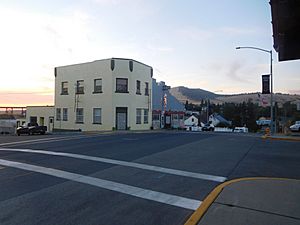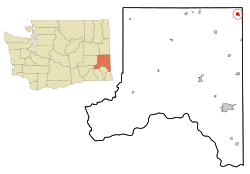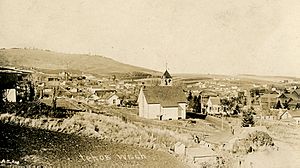Tekoa, Washington facts for kids
Quick facts for kids
Tekoa, Washington
|
|
|---|---|
| City of Tekoa | |
 |
|

Location of Tekoa, Washington
|
|
| Country | United States |
| State | Washington |
| County | Whitman |
| Area | |
| • Total | 1.23 sq mi (3.18 km2) |
| • Land | 1.23 sq mi (3.18 km2) |
| • Water | 0.00 sq mi (0.00 km2) |
| Elevation | 2,533 ft (772 m) |
| Population
(2020)
|
|
| • Total | 817 |
| • Density | 664.2/sq mi (256.9/km2) |
| Time zone | UTC-8 (Pacific (PST)) |
| • Summer (DST) | UTC-7 (PDT) |
| ZIP code |
99033
|
| Area code | 509 |
| FIPS code | 53-70560 |
| GNIS feature ID | 1508933 |
| Website | www.tekoawa.com |
Tekoa (/ˈtikoʊ/ TEE-koh) is a small city in Whitman County, Washington, United States. In 2020, about 817 people lived there.
Tekoa is located in the beautiful, rolling fields of the Palouse region. It is served by State Route 27. A famous landmark in Tekoa is the old Milwaukee Road railroad bridge. This bridge now carries the Palouse to Cascades State Park Trail, which is a path for walking and biking. The city also has the historic Empire Theatre, an Art Deco style movie theater built in 1940 that has been fixed up.
Every June, Tekoa holds its yearly celebration called the Slippery Gulch Festival. This fun event includes a parade, an egg toss game, and fireworks.
Contents
History of Tekoa
The land where Tekoa is today was first home to the Coeur d'Alene people. Later, in 1886, two settlers named David A. Huffman and George T. Huffman moved there. The town was officially planned out in 1888. It was named after a town mentioned in the Bible.
Tekoa became an official city in 1889. At that time, it had just under 300 residents. It sits at the base of Tekoa Mountain, which is about 2,490 feet high. The city is on the far eastern edge of the Palouse region, west of the Benewah Range in Idaho. In 1908, the large railroad bridge above the town was built. By 1910, the population had grown a lot, reaching 1,694 people.
Over the next 60 years, Tekoa's population started to shrink. This happened because new machines for farming meant fewer workers were needed. Also, the railway was no longer used. By 1990, fewer than 750 people lived in Tekoa. However, during the 1990s, the population grew again to 826 people by the year 2000.
Geography of Tekoa
Tekoa is located at 47°13′29″N 117°4′25″W / 47.22472°N 117.07361°W. The city's zip code is 99033.
According to the United States Census Bureau, Tekoa covers a total area of about 1.14 square miles (3.18 square kilometers). All of this area is land.
Tekoa is also located where two creeks meet. This meeting point is where Little Hangman Creek flows into Latah Creek.
Climate in Tekoa
Tekoa has warm, but not extremely hot, and dry summers. The average monthly temperature never goes above 71.6 degrees Fahrenheit (22 degrees Celsius). Tekoa has a type of weather called a warm-summer Mediterranean climate. This means it has dry summers and mild, wet winters.
People of Tekoa
Population Changes
The table below shows how Tekoa's population has changed over the years:
| Historical population | |||
|---|---|---|---|
| Census | Pop. | %± | |
| 1890 | 301 | — | |
| 1900 | 717 | 138.2% | |
| 1910 | 1,694 | 136.3% | |
| 1920 | 1,520 | −10.3% | |
| 1930 | 1,408 | −7.4% | |
| 1940 | 1,383 | −1.8% | |
| 1950 | 1,189 | −14.0% | |
| 1960 | 911 | −23.4% | |
| 1970 | 808 | −11.3% | |
| 1980 | 854 | 5.7% | |
| 1990 | 750 | −12.2% | |
| 2000 | 826 | 10.1% | |
| 2010 | 778 | −5.8% | |
| 2020 | 817 | 5.0% | |
| U.S. Decennial Census | |||
Who Lives Here?
In 2010, there were 778 people living in Tekoa. These people lived in 307 homes. About 31% of these homes had children under 18 living in them. Many homes (about 50%) were married couples living together.
The average age of people in Tekoa was 44.4 years old. About 25% of the residents were under 18 years old. About 23% were 65 years old or older. The city had slightly more females (53%) than males (47%).
Most people in Tekoa (92%) were White. Other groups included Native American (3.3%), Asian (0.5%), and people from two or more races (1.5%). About 5.8% of the population was Hispanic or Latino.
Famous Faces
- Mildred Bailey, a popular jazz singer from the 1930s, was born in Tekoa.
- Oliver L. Barrett (1892–1943), a sculptor and teacher.
- Al Rinker, a singer and brother of Mildred Bailey, was also born in Tekoa. He was part of a famous singing group called the Rhythm Boys with Bing Crosby.
- Susannah Scaroni, a Paralympic athlete, is from Tekoa.
See also
 In Spanish: Tekoa (Washington) para niños
In Spanish: Tekoa (Washington) para niños
 | Selma Burke |
 | Pauline Powell Burns |
 | Frederick J. Brown |
 | Robert Blackburn |


